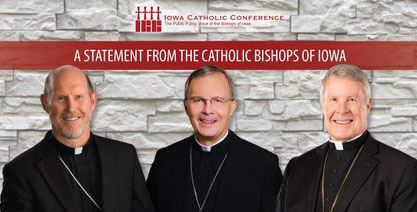Iowa Catholic bishops address new law affecting immigrants
May 3, 2024

From the Iowa Catholic Conference
Statement on Migration
Feast of St. Joseph the Worker, May 1
On this feast day of St. Joseph the Worker, we want you to know of our concern for the health and safety of all migrants and their families, no less than the other residents of our state. Pope Francis has said that chapter 25 of Matthew’s Gospel, which calls us to welcome the stranger, is “a constant admonition to see in the migrant not simply a brother or sister in difficulty, but Christ himself, who knocks at our door.” We are ready to serve in accordance with our sincerely held religious beliefs, following the teachings of Jesus Christ.
The situation at the southern border has engendered fear and a resolution by many to look for local solutions. At the state level, we have opposed migration enforcement measures such as SF 2340 because they place a disproportionate emphasis on punitive sanctions, undermine family unity, reduce humanitarian protections, and provide no viable solutions for long-time residents without legal status. Nor can the State of Iowa simply “remove” people to another sovereign nation without that country’s permission.
It is especially problematic that SF 2340 would explicitly allow state officials to prosecute an individual for state immigration crimes, even if that person’s application for immigration relief is pending before federal authorities or they have actually received federal authorization to be present. Further, state and local officials have little training in interpreting federal immigration law. We ask officials to ensure the protection of human rights and dignity of the persons involved. Families should receive special consideration and not be separated.
We also express our solidarity with Bishop Mark Seitz of El Paso and the Texas bishops, who insist that the dignity of migrants be respected while our country exercises its right to maintain its borders.
While Catholics may disagree within the limits of justice on the specific approach to reforming the immigration system, we ask lawmakers in Washington, D.C., to resist easy answers and do their job. As the Iowa Catholic Conference said decades ago, we again ask for "border protection policies that are consistent with humanitarian values and with the need to treat all individuals with respect, while allowing the authorities to carry out the critical task of identifying and preventing entry of terrorists and dangerous criminals."
As we remember our history as immigrants in Iowa, let us work together towards a fair and compassionate resolution of our challenges with migration.
Declaración del Obispo sobre Inmigración
Fiesta de San José el Obrero
1 mayo 2024
En esta Fiesta de San Jose Obrero, queremos que sepan de nuestra preocupación por la salud y la seguridad de todos los migrantes y sus familias, no menos que los demás residentes de nuestro estado. El Papa Francisco ha dicho que el capítulo 25 del Evangelio de Mateo, nos llama a dar la bienvenida al extranjero, es “una advertencia constante para ver en el migrante no solo a un hermano o hermana en dificultad, sino a Cristo mismo, que llama a nuestra puerta”. Estamos dispuestos a servir de acuerdo con nuestras creencias religiosas sinceras, siguiendo las enseñanzas de Jesucristo.
La situación en la frontera sur ha engendrado temor y la decisión de muchos de buscar soluciones locales. A nivel estatal, nos hemos opuesto a las medidas de imposición de la ley migratoria SF 2340 porque ponen un énfasis desproporcionado en las sanciones punitivas, debilitan la unidad familiar, reducen las protecciones humanitarias y no bridan soluciones viables para los residentes de largo tiempo, en EEUU, sin estatus legal. Tampoco puede el Estado de Iowa simplemente “remover” a las personas a otra nación soberana sin permiso de ese país.
Es especialmente problemático porque el SF 2340 permite explícitamente a los funcionarios estales enjuiciar a un individuo por delitos estatales de inmigración, incluso si la solicitud de alivio migratorio de esa persona está pendiente ante las autoridades federales o si han recibido autorización federal para estar presente. Además, los funcionarios estatales y locales tienen poca capacitación en la interpretación de la ley federal de inmigración. Pedimos a los funcionarios que garanticen la protección de los derechos humanos y la dignidad de las personas involucradas. Las familias deben recibir una consideración especial y no deben ser separadas.
También expresamos nuestra solidaridad con el obispo Mark Seitz de El Paso y los obispos de Texas, quienes insisten en que se respete la dignidad de los migrantes mientras nuestro país ejerce su derecho a mantener sus fronteras.
Si bien los Católicos pueden estar en desacuerdo dentro de los límites de la justicia sobre el enfoque específico para reformar el sistema de inmigración, pedimos a los legisladores en Washington, D.C., que se resistan a las respuestas fáciles y hagan su trabajo. Como dijo la Conferencia Católica de Iowa hace décadas, nuevamente pedimos que las “políticas de protección fronteriza sean consistentes con los valores humanitarios y con la necesidad de tratar a todas las personas con respeto, al mismo tiempo que permitan a las autoridades llevar a cabo la tarea critica de identificar y prevenir la entrada de terroristas y criminales peligrosos”.
Al recordar nuestra historia como inmigrantes en Iowa, trabajemos juntos hacia una resolución justa y compasiva de nuestros desafíos con la migración.